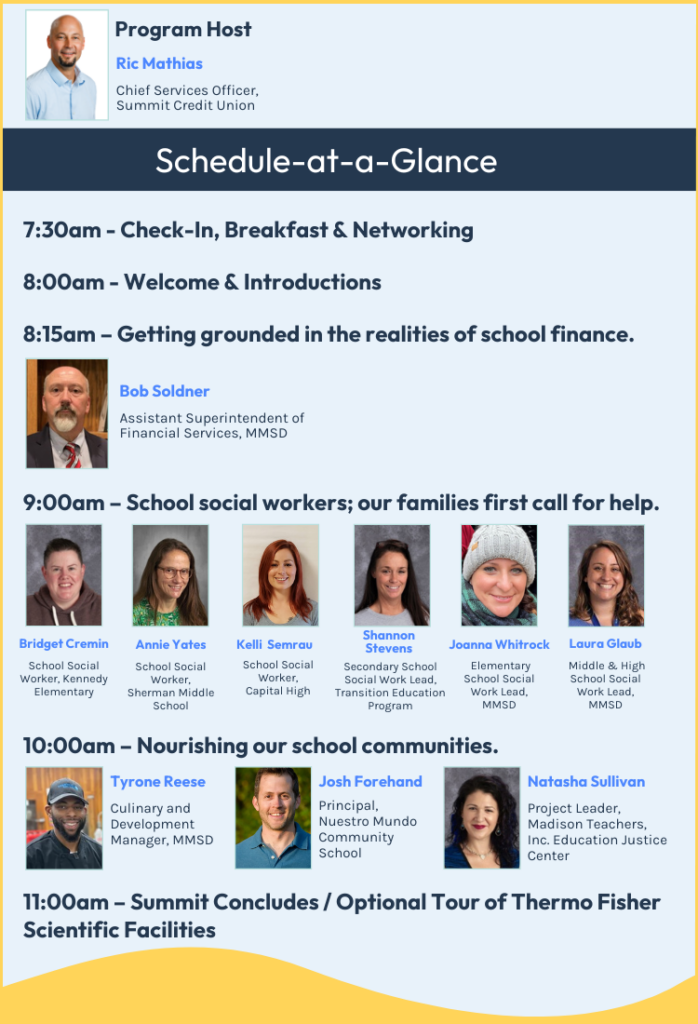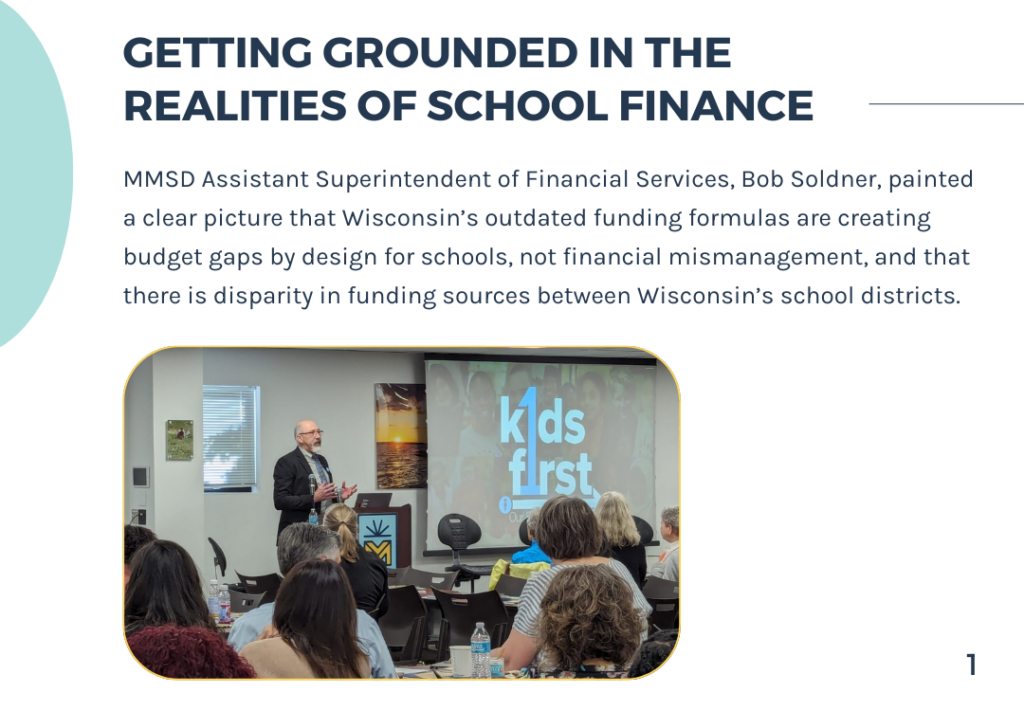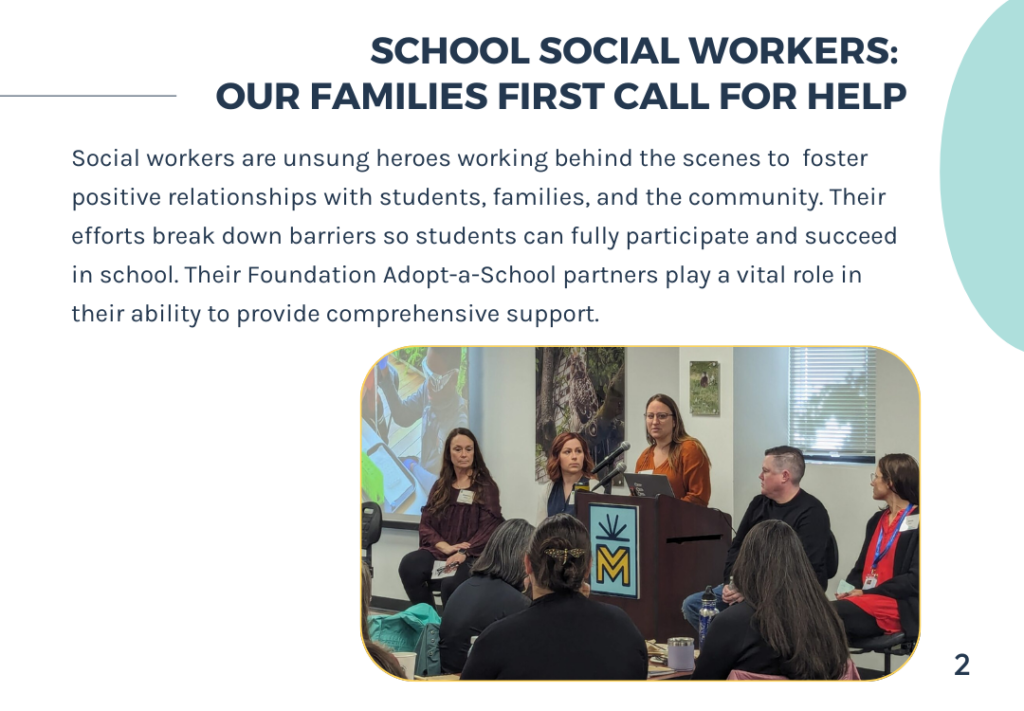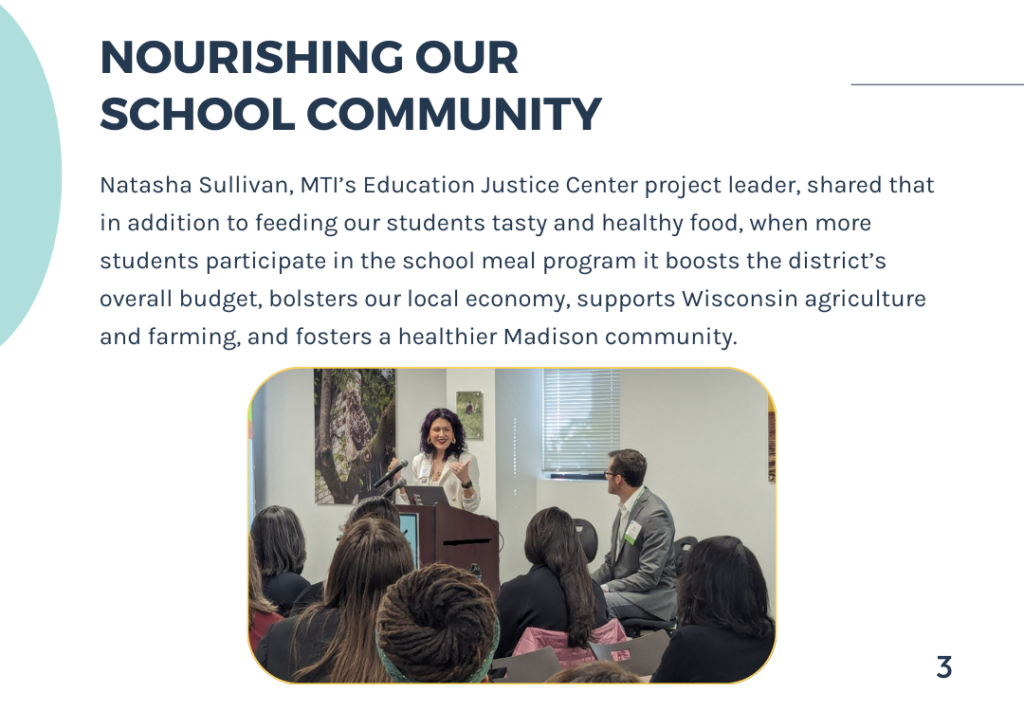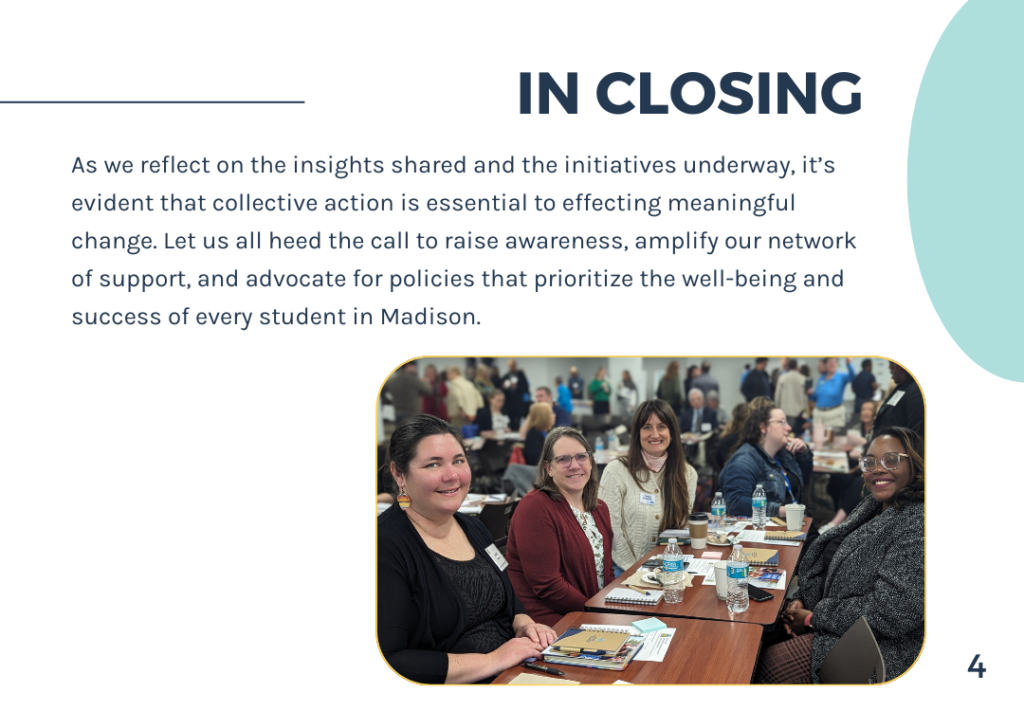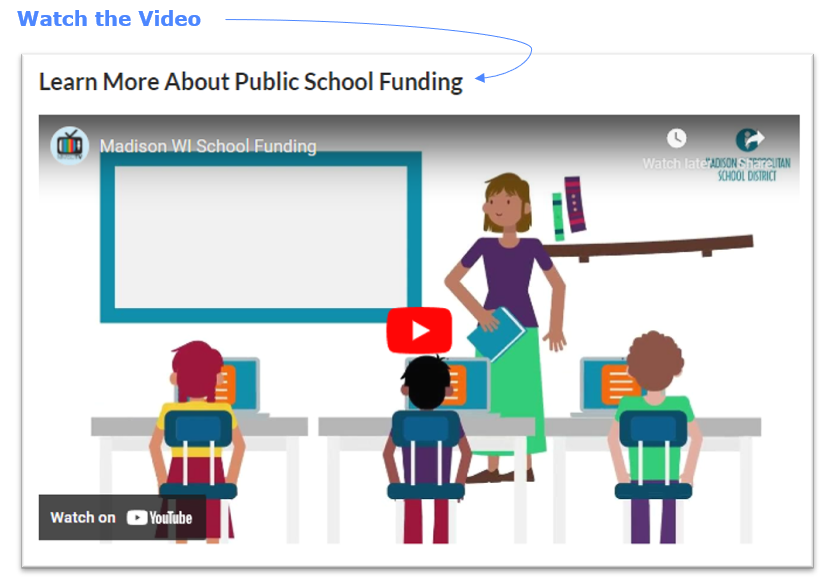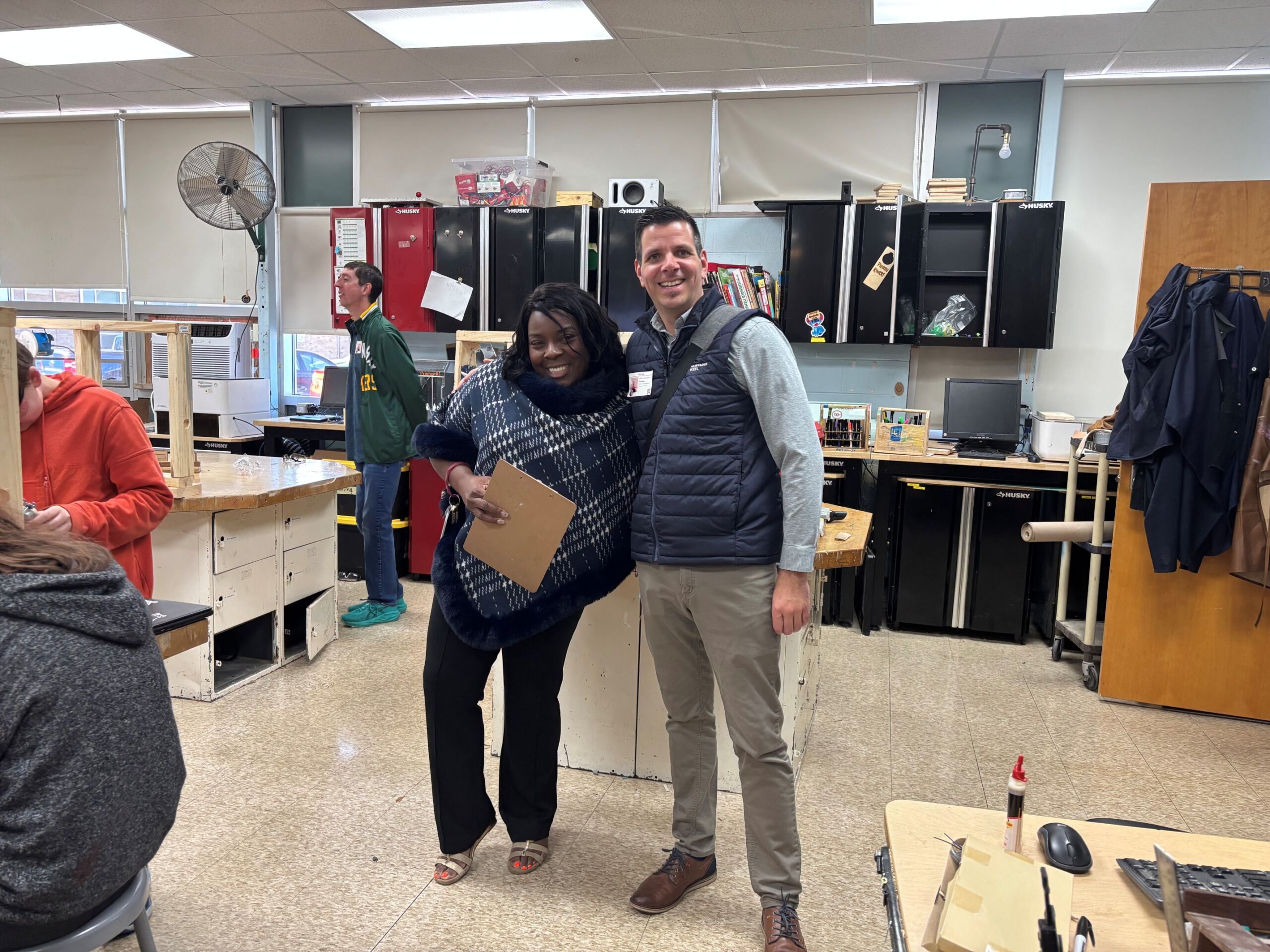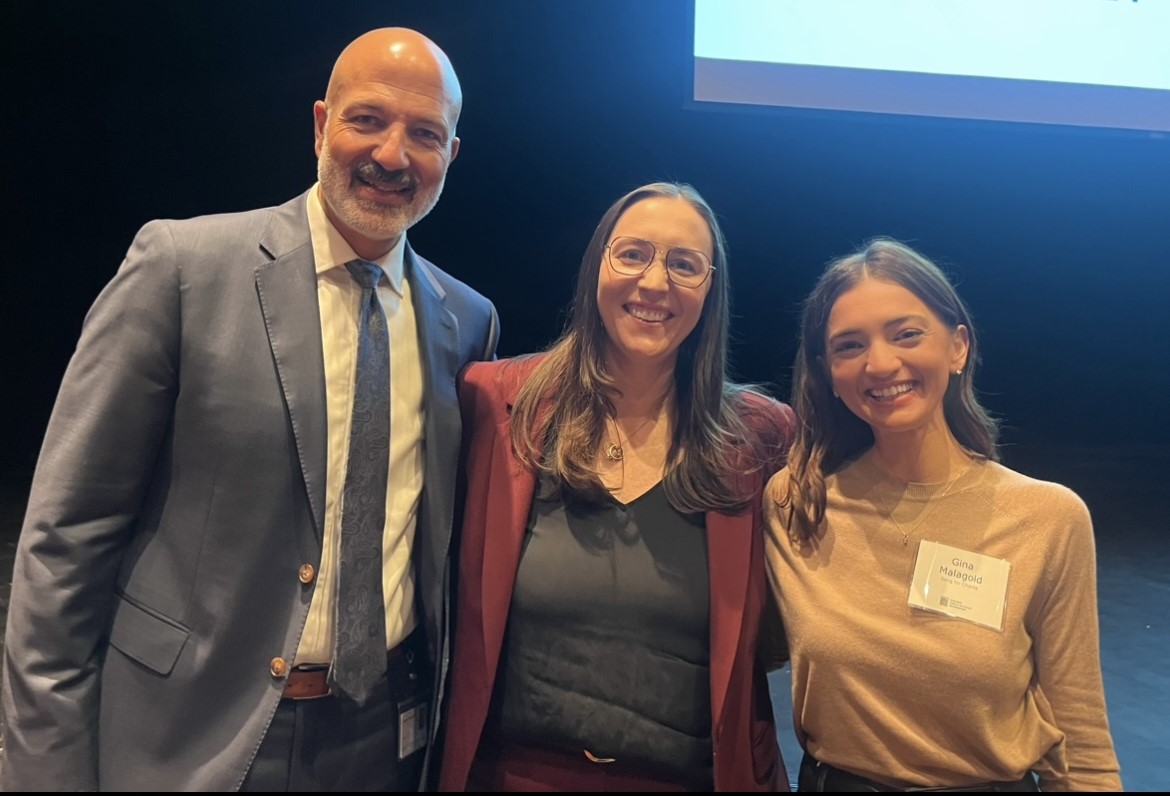The 2nd Annual Schools Make Madison Summit, held on April 25th, 2024 at Thermo Fisher Scientific, was a powerful convergence of educators, policymakers, innovators, and community stakeholders, all dedicated to driving positive change in Madison’s public schools. The 150+ attendees were immersed in some perhaps unknown realities about school funding and budgets, the vital role social workers have in student success, and the mechanisms of the school nutrition program.
Getting Grounded in the Realities of School Finance

Bob Soldner, MMSD Assistant Superintendent of Financial Services, shared the intricacies of school funding, particularly the disconnect between funding and expenses, and the disparity in funding sources across Wisconsin’s school districts. Attendees learned:
- Wisconsin school districts work hard to balance their budgets, yet school resources have been shrinking yearly since 2010.
- State policy limits how much school districts can spend through a mechanism called revenue limits which act as a per-student cap on what school districts can spend each year. Since 2010, the revenue caps have no longer adjusted based on inflation.
- By the end of 2025, the revenue limit will have fallen more than $3,300 per student behind inflation – for MMSD that is an $82,000,000 decrease!
- Each district has a different revenue cap and these caps are not tied to the needs of the students or the cost to the schools that serve them.
- Madison’s funding formula is 10% state aid and 90% property taxes.
- Since the incorporation of revenue limits, over 80% of school districts have filled the state-imposed funding gaps by asking local voters to raise their caps through an operating referendum. Most of these districts have used the option multiple times.
- Wisconsin’s low 31% reimbursement rate for special education leaves school districts on the hook for filling the gap. For MMSD that gap is $66.4 million annually. Statewide the special education funding gap is $1.5 billion annually.
Attendees found this short video shared by Soldner helpful in breaking down the complex funding formula. One attendee commented, “Let’s make this video go viral.” We agree — it’s time to clarify the opaque mechanisms behind school funding.
TAKE ACTION: Watch the video, share it widely, and engage with us to make a difference for our schools!
School Social Workers: Our Families First Call for Help
Ever wondered about the crucial role of an MMSD Social Worker? Summit attendees quickly learned from Laura Glaub, MMSD’s Middle & High School Social Work Lead, that they are the unsung heroes behind the scenes, fostering positive relationships with students, families, and the community to remove barriers impeding success in school. They’re the linchpin for student support, from coordinating attendance improvement efforts to serving as the point of contact for families who are experiencing homelessness. But it doesn’t stop there! They advocate for families, connect them with vital resources, and provide invaluable case management services. Ultimately, they’re the bridge between students, families, and the resources they need to thrive academically and beyond.
However, they can’t do it alone. MMSD Social Workers rely on the support of their Foundation Adopt-a-School (AaS) partners to amplify their impact. By joining forces with their AaS partners, MMSD social workers enhance their ability to provide comprehensive support, ensuring that no student or family falls through the cracks.
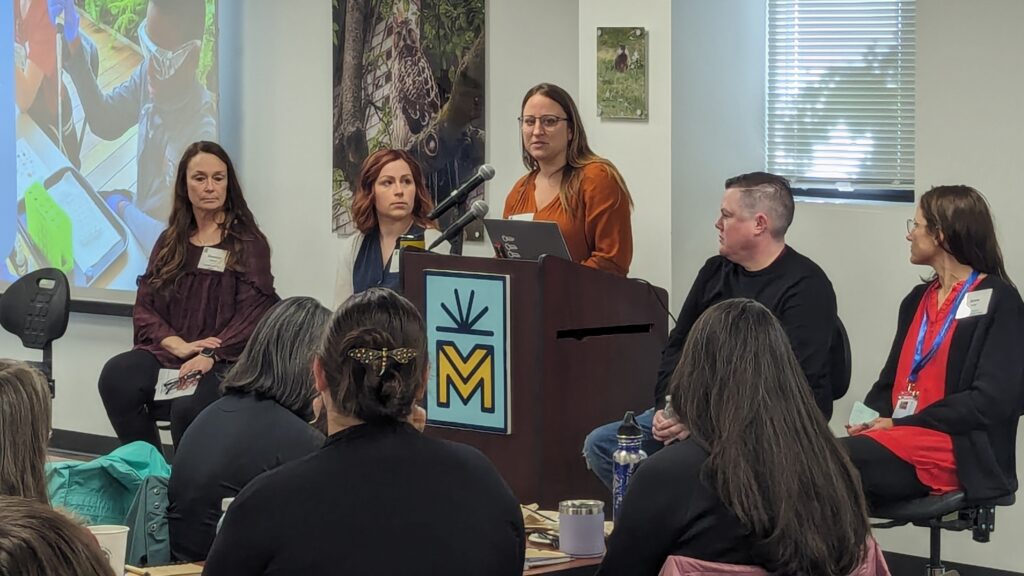
Attendees also heard from:
- Bridget Cremin, Social Worker, Kennedy Elementary
- Kennedy is an elementary school with ~600 students on the far East side of Madison.
- Kennedy community has undergone significant changes in the last few years with the addition of 3 new housing developments and the Salvation Army Family Shelter. As a result of these changes, their needs have increased dramatically.
- Kennedy’s AaS partners, Messiah Lutheran Church, St. Paul AME Church, Crosspoint Church, and Door Creek Church have provided invaluable behind-the-scenes support including clothing, winter gear, school supplies and snack donations, financial contributions, and volunteers throughout the year.
- Messiah Lutheran also established an innovative transportation program to help boost attendance
- Anne Yates, Social Worker, Sherman Middle School
- Anne is new to Sherman Middle, having previously worked at Cherokee Heights Middle. The schools and communities are different, but the needs remain consistent. Needs exist throughout Madison, not just in specific neighborhoods.
- Anne shared that Cherokee Heights Middle School Adopt-a-School partners, Thermo Fisher Scientific and Westminster Presbyterian, made it possible for students to have basic needs met through donations of food, clothing, and school supplies.
- At Sherman Middle School, Anne looks forward to working with Adopt-a-School partner American Family Insurance.
- Kelli Semrau, Social Worker, Capital High
- Capital High is a choice-based alternative MMSD high school that employs a Competency-Based Education Model.
- Nearly 90% of students qualify as low-income (CEP School); almost 40% of students have IEPs; almost 15% of students are Unaccompanied Youth and/or homeless or doubled-up.
- Their Adopt-a-School partners include Wisconsin Evaluation Collaborative (WEC) and Blackhawk Church Downtown which provides support in myriad ways. Including, donations of personal essentials, supplies for student trips to Historically Black Colleges & Universities (HBCUs), new parent supplies/supports, leadership groups, and more.
- Shannon Stevens, Secondary School Social Work Lead, Transition Education Program
- MMSD’s Transition Education Program (TEP) ensures compliance with the McKinney-Vento Homeless Assistance Act, working to reduce barriers to school enrollment and achievement so that children from families who are experiencing homelessness have a “full and equal opportunity” to succeed in school.
- Every single MMSD school has students identified as homeless, with district-wide numbers at 1,200+ and rising, and the volume of needs for each student rising in tandem.
- The two social workers serving the TEP program also provide support and consultation for school-based staff supporting students.
- In 2014, Alpha Delta Kappa (ADK) became an Adopt-a-School partner to TEP. One of the most prized components of the partnership is the organizing of TEP’s donation center which has clothing, winter wear, undergarments, socks, school supplies, backpacks, hygiene supplies, and more available to students in need. ADK volunteers also process and package social worker requests that are sent to schools across the district.
- Recently, Alpha Xi Delta (AZD) – Theta Chapter became a second AaS partner to TEP, leveraging their Blue & Gold Gala to raise funds for TEP, volunteering in TEP’s donation center, and raising awareness on the UW campus during Homelessness Awareness Month.
Every one of the social workers expressed gratitude for their Adopt-a-School partners, sharing how critical and helpful they are to their school communities, and what a void they would feel without their partners. Currently, there are 25 schools in need of partners. We encourage you to consider any organizations or businesses that might be interested in becoming a new partner. They make a significant difference in enriching the educational experience for students across our district. It truly takes a village to nurture the success of our youth.
TAKE ACTION: Contact Mary Bartzen to learn more about becoming an Adopt-a-School partner: mbartzen@schoolsmakemadison.org
Nourishing Our School Community
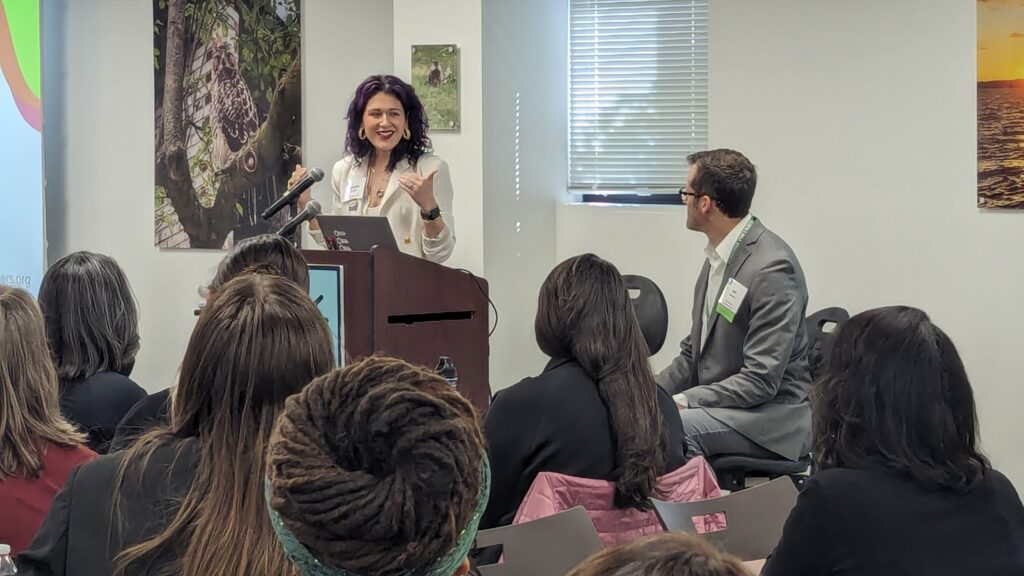
Ensuring that no child goes hungry is not just a moral imperative; it’s a fundamental investment in our collective future. The ripple effects of hunger are profound, impacting not only academic performance but also behavior, cognitive and physical development, and even social well-being. Natasha Sullivan, Project Leader at MTI’s Education Justice Center, shared that free school meals not only benefit individual students but also bolster our local economy and support Wisconsin agriculture and farming, fostering a healthier Madison community. When families opt into school meal programs, more funds become available to enhance the quality of our lunches, making them better for everyone.
In a bold move toward food justice, the Education Justice Center embarked on a multi-year effort to sustain participation and increase support for MMSD school food.
- Years: 2021-22 – Formation of Education Justice Coalition
- Foundation Board Member Kerry Motoviloff led the work to establish the Education Justice Coalition, a community-based family of organizations collaborating to facilitate inclusive, safe, and equitable educational spaces. The Coalition takes direct action to elevate student voice and to design systems that support the truth and vision of our youth.
- Years: 2022-23 – Research & Action Planning
- The Coalition partnered with UW Madison, REAP, and MMSD Food and Nutrition to implement rigorous research methods, including data collection, site observation, caregiver surveys, and district visits, and discovered that nutrition, taste, appearance, and convenience strongly influenced participation in the school lunch program. The changes respondents wanted most were scratch cooking, improved taste and appearance, reduced plastic packaging, and free meals for all children.
- Years: 2023-24 – Raise Awareness & Establish a Campaign
- To raise awareness about the mechanisms and benefits of school lunch programs, the Coalition launched an anti-bias informational social media campaign. Target audiences included families, community stakeholders, and “social justice warriors.” The social media campaign was accompanied by a series of in-person information sessions and community discussions.
- Year: 2024 – Launch of Scratch Cooking Pilot at Nuestro Mundo
- On Feb 8, 2024, at Nuestro Mundo Community School, the Coalition worked in partnership with the school, volunteers, and students to launch a scratch-cooking school lunch pilot program. Nuestro Mundo’s Principal, Josh Forehand, noted student feedback was overwhelmingly positive, and staff and teachers noticed a willingness of students to try the new meals.
Looking ahead, Natasha reinforced that scaling up this initiative involves both small increments at individual schools, as well as larger moves such as investments in kitchens as part of future referendums, grant opportunities, and long-term labor commitments.
TAKE ACTION: Encourage families to opt into school lunch 1-2 days a week at minimum and advocate to local representatives for healthy school meals for all Wisconsin children!
In Closing
The 2nd Annual Schools Make Madison Summit illuminated critical issues facing our public schools, from the complexities of funding to the indispensable role of social workers and the imperative of nourishing our school community. As we reflect on the insights shared and the initiatives underway, it’s evident that collective action is essential to affecting meaningful change. Let us heed the call to raise awareness, amplify support networks, and advocate for policies that prioritize the well-being and success of every student in Madison.
Together, we can build a brighter future for our schools and our community.
TAKE ACTION: Make a gift to the Foundation to support our work to meet the needs of our district where state funding falls short.
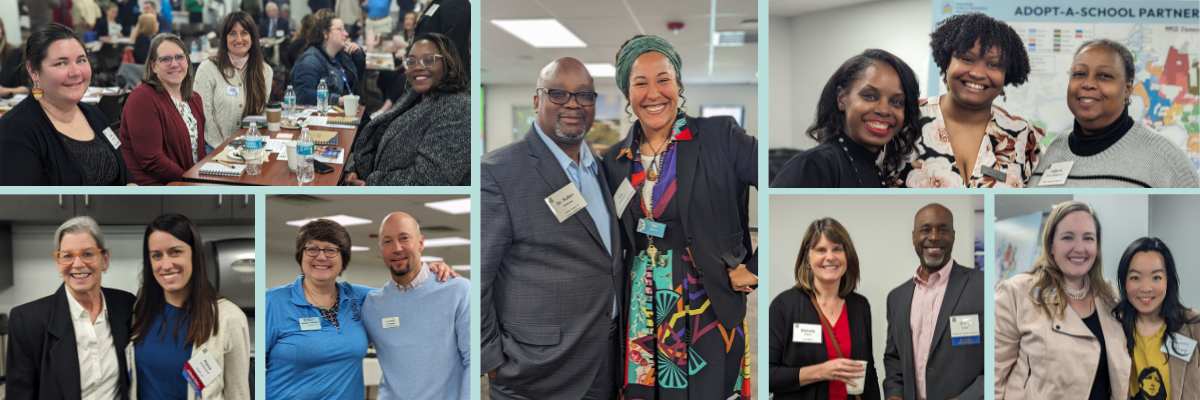
2024 PROGRAM RECAP
